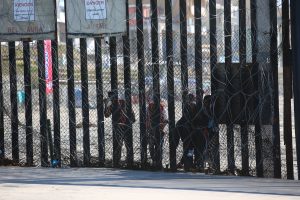Late last year, the U.S. government “facilitated the removal of Uzbekistani citizens who unlawfully entered the United States.” Uzbekistan’s Agency for External Labor Migration reported that 119 Uzbek citizens, most of whom had crossed illegally into the U.S. from Mexico, had been returned to Tashkent.
Earlier, in October, Fox News reported on leaked U.S. Customs and Border Protection (CBP) data for October 2021 to October 2023, which noted that agents had encountered 13,624 people attempting to cross into the U.S. illegally from Uzbekistan. The data, Fox reported, did not include information “on how many of those migrants were removed or who were released into the U.S. with a court date.”
But the following month, the U.S. Department of Homeland Security informed the State Department that Uzbek nationals caught trying to enter the United States via Mexico illegally would not be released into the U.S. but detained, pending the conclusion of their immigration cases. At the time, in announcing the change the U.S. embassy in Tashkent also noted that those caught illegally crossing the U.S. border would be banned from legal re-entry for at least five years, and those who help individuals migrate illegally could be permanently ineligible for a U.S. visa.
Nevertheless, the draw of the United States persists.
In October 2023, law enforcement in Samarkand were contacted by a 22-year-old man who reported that a man going by the name “Damir” had promised to help him get to Mexico on a charter flight. The two men had met in a “USA Mexico reviews” Telegram group. After accepting $10,000, “Damir” vanished with the money. Police later identified “Damir” as a 26-year-old Samarkand resident and filed fraud charges against him.
In January, law enforcement in Samarkand region detained a man who promised another he could send him to the U.S. via Turkey, Qatar, and Mexico, for $18,000.
This week, a joint raid carried out by the State Security Service and the Ministry of Internal Affairs in Andijan detained “fraudsters” who had promised to send other Uzbek citizens to the United States via Mexico. One man was detained after receiving $15,000. Another citizen was detained receiving for $6,000 from the first man.
“Illegal migration via the U.S.-Mexico Border to the United States is dangerous and expensive,” the U.S. embassy in Tashkent warned in December. “We strongly condemn the actions and caution Uzbeks not to fall prey to the lies of criminal smugglers who regard persons as commodities.”
Current Time, citing reporting by RFE/RL’s Uzbek Service, Radio Ozodlik, observed that while the migration of Central Asians to the U.S. via Mexico started about five years ago, the numbers have radically increased. “Now the issue of illegal entry into America through Mexico is openly discussed in dozens of Telegram channels.”
The report noted a pattern: fantastic stories of successful migrants who took the path through Mexico and are now living large in the United States would inspire others to seek out the same route. “In one of these channels, Ozodlik’s journalists were given a 100% guarantee that for $19,000 they would be sent through Mexico to the United States.”
Uzbek citizens interested in getting to the United States are confronted with a confusing miasma of regulations, made all the more murky by disinformation and scammers. With legal pathways, such as the “green card lottery,” little more than a random gamble, illegal options are attractive. But the risks just proliferate: How can one tell the difference between a real people smuggler and a scam artist just making promises on the internet? Sometimes the smuggler is real and has prior connections to terrorist groups like the Islamic State that draw even greater attention and concern. Sometimes it’s just a guy with a Telegram handle making wild promises. When dealing with shades of the illegal, everything starts to look gray.
It’s clear that both Washington and Tashkent view this as a serious problem. “Uzbekistan’s partnership to facilitate the return of its nationals subject to removal from the United States shows its commitment to international obligations,” the U.S. embassy stated.

































